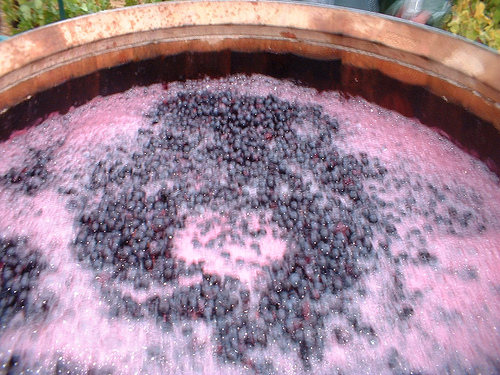You know the deal; the more some folks learn about a topic, the more shortcuts/slang/acronyms/initials/technical jargon can be tossed around. I’m here to help you understand those sometimes mysterious words and phrases, thus – Wine Words Demystified! This week’s phrase is Barrel Fermented..
According to Karen MacNeil‘s The Wine Bible:
Used to describe a wine – usually a white – that has undergone fermentation in small oak barrels as opposed to in a more neutral large casks, cement vats, or stainless steel tanks. Fermentation in a small barrel can impart a richer flavor and creamier texture to some wines, though these characteristics may be acquired at the expense of the wines’ FRUIT. To mitigate against too intense a barrel-fermented character, winemakers can use older barrels, larger barrels, and/or ferment only a portion of the wine in barrels and then BLEND this portion with the wine that has not been barrel-fermented
In other words, a barrel fermented wine is one where grape juice along with yeast, is put into small (50 gallon) oak barrels.

The advantage of barrel fermenting wine is that the wines are richer and more complex (there is an assortment of appealing aromas and flavors such as vanilla, spice, and toast) than those fermented in other vessels.
On the other hand, barrel fermentation is a very labor intensive and expensive process because of the number of barrels needed (as opposed to fermenting the wine in much larger stainless steel tanks for instance). Not only do all the barrels need tending to, it’s expensive to purchase the barrels. And if new oak is used each year, it’s expensive to replace the barrels. As a consequence, barrel fermented wines are typically more expensive than wines fermented in other vessels.
White wines that are barrel fermented are lighter in color, but typically have a silkier texture than white wine fermented in stainless steel then aged in oak. White wines fermented in stainless steel, then aged in oak tend to have a darker color because of the phenolic compounds remaining in the wine.
Top Burgundy producers barrel ferment their wines, as do many high-end California wineries.
Related “Wine Words Demystified” posts:
Follow me on Twitter @martindredmond, Facebook, or Pinterest